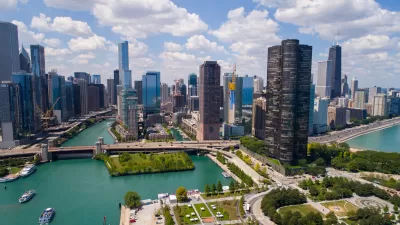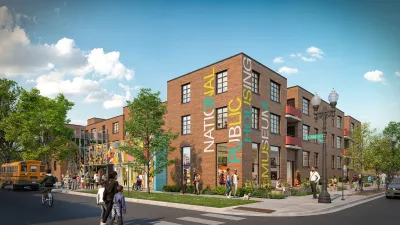The ‘workers’ cottages’ are being replaced with larger, more expensive homes, threatening one of the city’s original forms of affordable housing.

“Workers cottages are ubiquitous in Chicago, though they’re perhaps not as well known by name as their younger sibling, the bungalow.” Writing for WTTW, Nick Blumberg describes this commonly overlooked form of housing. “They’re simple homes of four to six rooms with a gabled roof at the front of the house and an entrance off to one side – usually one story, sometimes two.” According to Blumberg, “The Workers Cottage Initiative estimates there are as many as 60,000 of these homes around the city. The earliest date back to the 1860s, but construction really started to take off in the 1880s.” A quarter of the parcels surveyed in McKinley Park are workers’ cottages, and the Initiative plans to complete more studies next year.
This iconic form of early affordable housing faces destruction as many of the homes are demolished to make way for new houses. “The Workers Cottage Initiative tracked demolitions in Logan Square and Avondale between 2006 and 2020. In Logan Square, 46% of buildings knocked down were workers cottages. In Avondale, 40%.”
“In many places where workers cottages are knocked down, the new homes are larger and more expensive – meaning preservation isn’t just about history, it’s about holding onto the city’s rapidly declining affordable housing.” Elizabeth Blasius of Preservation Futures says the cottages are more than a historical curiosity. “There’s still such a potential for workers cottages to fulfill our housing needs today.”
FULL STORY: Cataloging and Celebrating the Workers Cottage, One of Chicago’s Original Affordable Homes

Maui's Vacation Rental Debate Turns Ugly
Verbal attacks, misinformation campaigns and fistfights plague a high-stakes debate to convert thousands of vacation rentals into long-term housing.

Planetizen Federal Action Tracker
A weekly monitor of how Trump’s orders and actions are impacting planners and planning in America.

In Urban Planning, AI Prompting Could be the New Design Thinking
Creativity has long been key to great urban design. What if we see AI as our new creative partner?

Milwaukee Launches Vision Zero Plan
Seven years after the city signed its Complete Streets Policy, the city is doubling down on its efforts to eliminate traffic deaths.

Portland Raises Parking Fees to Pay for Street Maintenance
The city is struggling to bridge a massive budget gap at the Bureau of Transportation, which largely depleted its reserves during the Civd-19 pandemic.

Spokane Mayor Introduces Housing Reforms Package
Mayor Lisa Brown’s proposals include deferring or waiving some development fees to encourage more affordable housing development.
Urban Design for Planners 1: Software Tools
This six-course series explores essential urban design concepts using open source software and equips planners with the tools they need to participate fully in the urban design process.
Planning for Universal Design
Learn the tools for implementing Universal Design in planning regulations.
Gallatin County Department of Planning & Community Development
Heyer Gruel & Associates PA
JM Goldson LLC
City of Camden Redevelopment Agency
City of Astoria
Transportation Research & Education Center (TREC) at Portland State University
Jefferson Parish Government
Camden Redevelopment Agency
City of Claremont





























